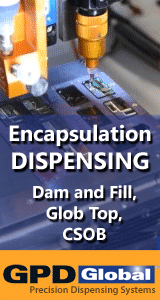Ionic Cleanliness testing machines are designed to determine the total ionic content extractable from the printed wiring board for purposes of process control. The conductivity of the extract solution is measured and the results are expressed as sodium chloride equivalence per unit area. The problem with this method is twofold: 1) Many of today’s low residue flux and lead-free flux residues are not soluble in the extract solution. 2) Contamination of concern is with site-specific components, from which contamination does not correlate to the area of concern. The purpose of this study is to research low residue and lead-free flux structures, identify solvent compositions that will dissolve these residue types, and offer options for performing both bulk and site-specific ionic cleanliness testing methods.
Cleaning challenges are increasing due to the evolution of high-density designs and the transition to lead-free soldering flux chemistries. Both create separate and additive requirements for cleaning and cleanliness testing. This session will explore cleaning chemistries, flux chemistries, and cleanliness testing chemistries in an effort to provide insight into current technologies and what work is still needed in the area of critical cleaning and cleanliness testing.
Kyzen is a leading supplier of precision cleaning chemistries to the worldwide electronics, metal finishing, medical, semiconductor, and optical industries. Founded in 1990, Kyzen offers superior cleaning chemistries, technical support, application and analytical services throughout the world. Kyzen has won numerous industry awards for its exceptional products and all products are RoHS compliant. For more information, visit http://www.kyzen.com.





.gif)

